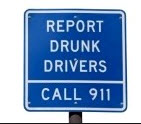DUI Indicators- According to the Police
The National Highway Traffic Administration has conducted research to help determine what police officers look for to identify drunk drivers. Contrary to what you might think, speeding is not a clue of insobriety. This is because studies show that a person who speeds often exhibits signs of heightened awareness in the form of quicker judgment and reflexes.
The higher the clue is on the list, the higher the probability of impairment. This information certainly isn’t to help you avoid getting caught, but to help you realize they are looking for any indication you are driving impaired and it’s incredibly difficult to game the system.
- Turning with a wide radius
- Straddling center of lane marker
- “Appearing to be drunk”
- Almost striking object or vehicle
- Weaving
- Driving on other than designated highway
- Swerving
- Speed more than 10 mph below limit
- Stopping without reason in traffic lane
- Following too closely
- Drifting
- Tires on center or lane marker
- Braking erratically
- Driving into opposing or crossing traffic
- Signaling inconsistent with driving actions
- Slow response to traffic signals
- Stopping inappropriately
- Turning abruptly or illegally
- Accelerating or decelerating rapidly
- Driving with headlights off
Marcus D. Wilcox
Attorney at Law, esq.
DISCLAIMER: The information contained on this website is meant to be general, informative and educational. It should not be taken as specific legal advice to any particular problem or issue. Please consult an attorney personally to discuss your particular circumstances.








